The Birds Or: Everything You Always Wanted to Know About Coronavirus (But Were Afraid to Ask Hitchcock & Heidegger), Part Seven
Derek Hawthorne5,283 words
Part 1, Part 2, Part 3, Part 4, Part 5, Part 6
With the gulls now retreating, Mitch and Melanie leave the Tides restaurant and make their way up the hill to Annie’s house to retrieve Cathy. All is deathly quiet. As they approach the schoolhouse, they see that the crows are back and perched all over. “Look, the crows again!” Melanie says breathlessly. But as they approach the little house with its picket fence, a still more horrifying sight awaits them.
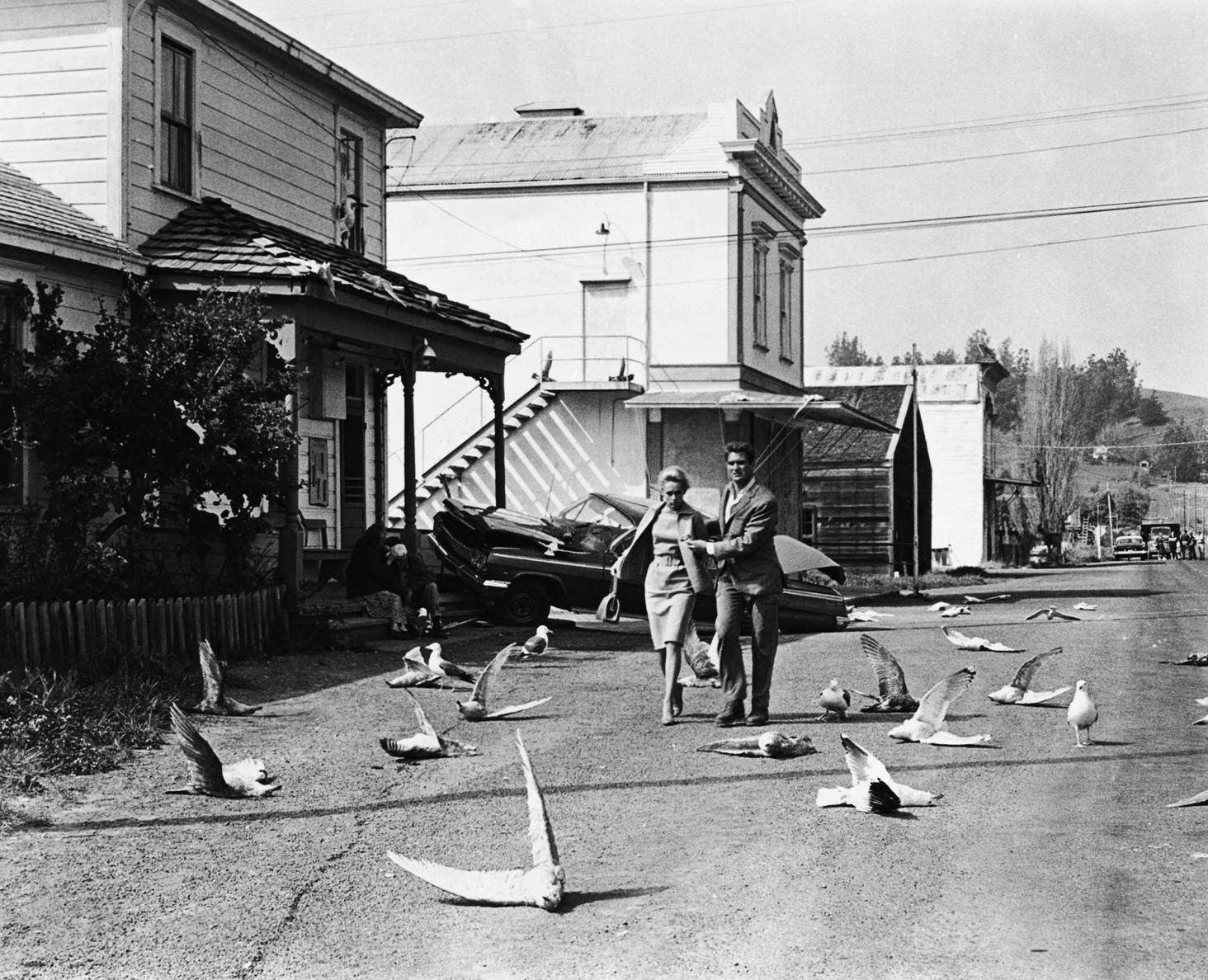
Deleted shot: Melanie and Mitch walk to Annie’s house
Annie lies dead on the gravel leading to the front steps. Her arms and legs are streaked with blood, her face turned away from us. Annie’s feet rest on the steps, but her right foot is twisted toward her other leg — indecorously, painfully, rigidly. She looks like a marionette tossed aside by a bored child who’s moved on to something new. The gate stands open, suggesting Annie had no time to close it. “Oh, no!” Mitch cries, grimacing. “Stay here,” he says to Melanie, and then moves closer to examine the body. Melanie watches from the street. When she sees Annie’s face, she screams. Just at that moment, Hitchcock shows us a closeup of the side of Suzanne Pleshette’s head. But before we can make out any details, Rod Taylor’s hand quickly moves into frame and pointedly conceals Pleshette’s eyes.
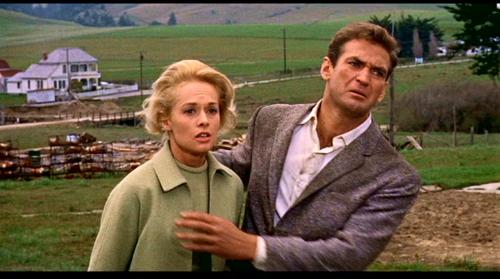
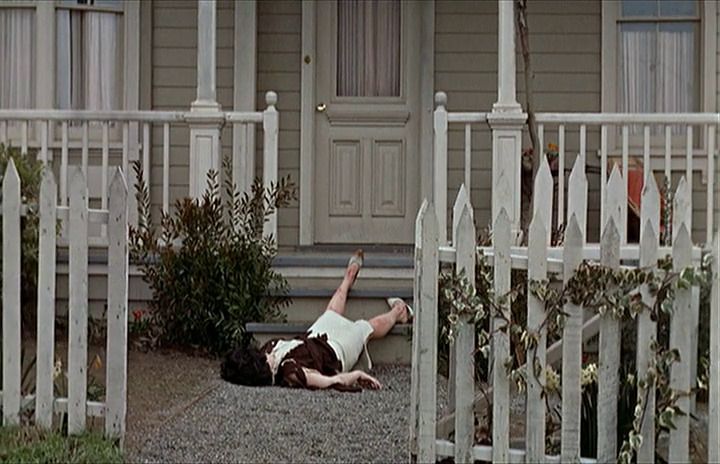
Those viewing the film at home can, of course, freeze the frame just before Taylor’s hand appears. If they do, they will see that while Pleshette’s face is blooded, her right eye is visible, and no special makeup has been applied to it. Nevertheless, the clear suggestion is that Annie has been blinded by the birds, just as Dan Fawcett was. Convulsed with horror, Melanie crosses her arms, hands clutching her shoulders, and doubles over. Then, in a childlike voice, she asks “Cathy? Where’s Cathy?” Camille Paglia correctly notes that “she has begun to regress — a slide that will continue until film’s end.” [1] We have heard this childlike voice before: in the scene on the dunes, when Melanie spoke of how her mother abandoned her.
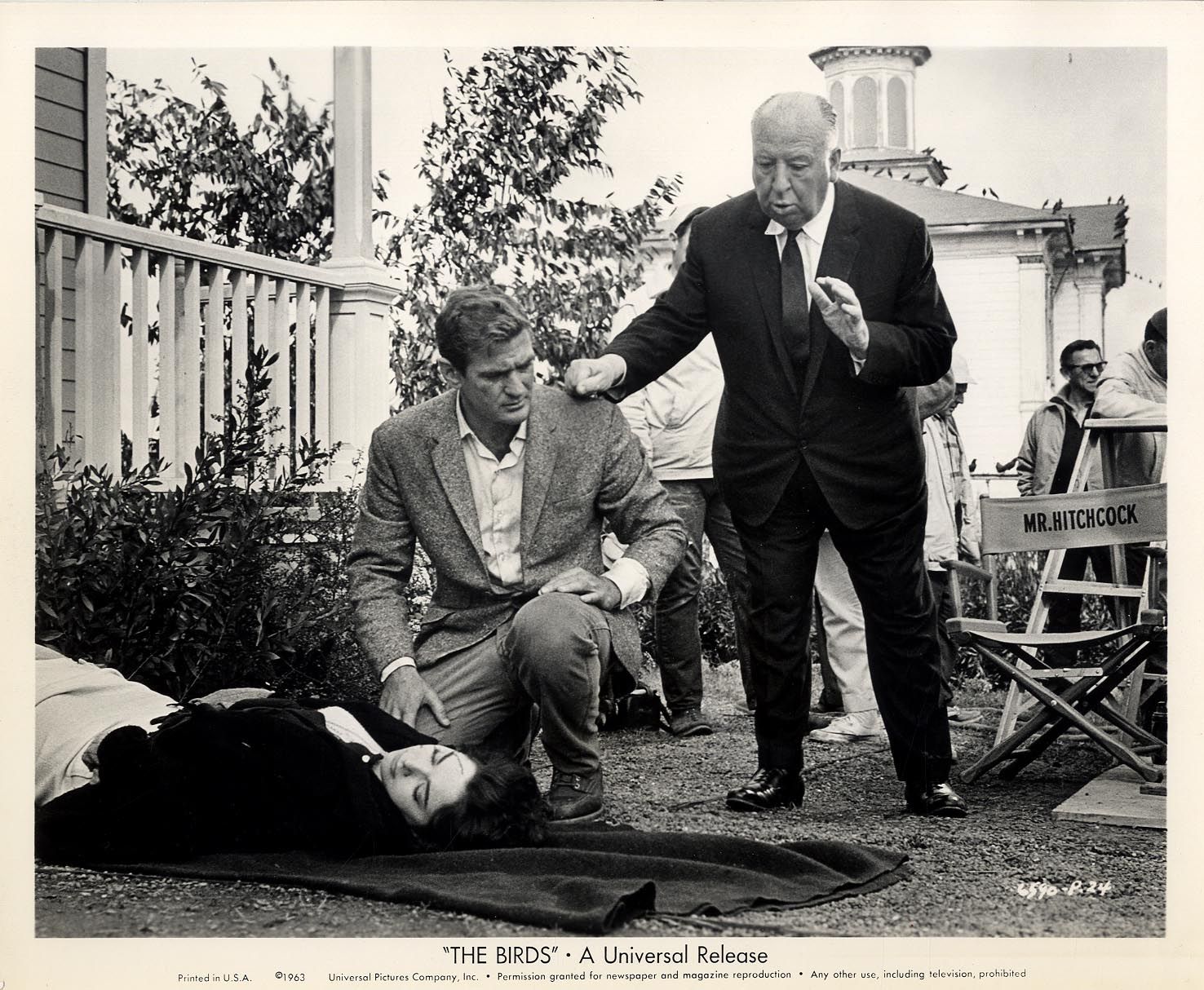
Cathy, face streaked with tears, is staring at them from one of the windows. She is safe and unharmed. Mitch enters through the front door and leads Cathy to the end of the porch, and down the side steps, to avoid his young sister having to encounter Annie’s body. Then he lifts her up and over the fence, where she and Melanie embrace. Melanie asks Mitch not to leave Annie’s body on the gravel. With eyes that convey great sadness, and possibly also regret, Mitch takes off his blazer and drapes it over his former love, then carries her body into the house. (He will spend the rest of the film in shirt sleeves.) The trio quickly make for Melanie’s car, which has been sitting by the school since Melanie arrived there some hours ago. As the crows begin to caw ominously, Mitch frantically closes the convertible’s top and they all pile in. Mitch is in the driver’s seat, despite the fact that it is Melanie’s car. This is a small, but significant act of masculine assertion.
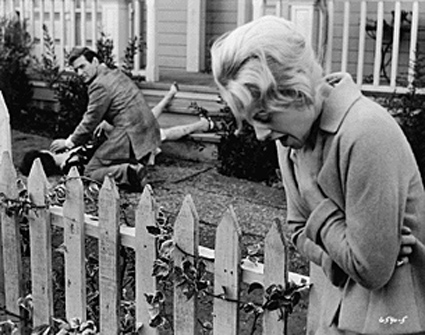
It is once the car gets underway that Cathy, who is still clinging to Melanie, collapses into hysterics. “On our way back from taking Michele home. . . we heard the explosion and went outside to see what it was,” Cathy says, choking back tears. “All at once the birds were everywhere. All at once she pushed me inside. . . and they covered her! Annie! She pushed me inside!” She then begins sobbing uncontrollably. It is a touching moment, very well played by young Veronica Cartwright.
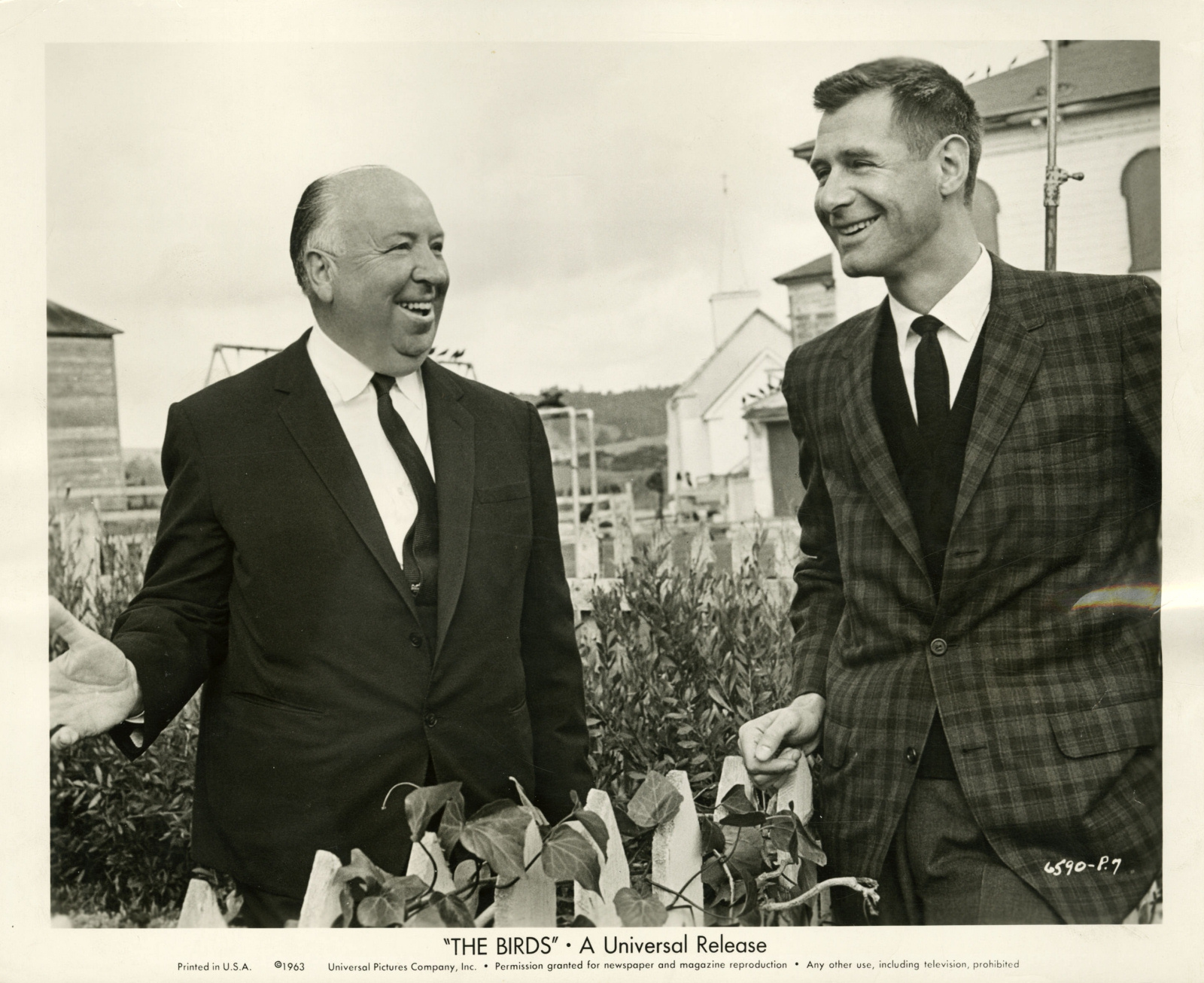
Hitch and screenwriter Evan Hunter at the shooting of Annie’s death scene.
What are we to make of this character, Annie Hayworth, and of her death? Dramatically, her death serves an obvious purpose. This is the first time a character we know and care for has been killed by the birds. There is a moment after finding Annie’s body where Mitch picks up some stones from the ground and, his face contorted in hate, is about to toss them at the crows. Melanie dissuades him from this. The death of Annie does not so much cause us to hate the birds, as to fear them even more. We knew that the situation was serious, but now we realize it can claim us — as we had identified with Annie, and sympathized with her. Her death causes us to fear for the other characters, especially Melanie. What is to be their fate?
There is a larger significance to Annie’s death, however. First of all, it is clearly an act of self-sacrifice. When Annie and Cathy went outside, the birds descended on them. Annie’s first thought was not for herself, but for Cathy, whom she pushes inside. But Annie is not able to follow the child into the house: “all at once. . . they covered her.” Cathy realizes the self-sacrificial nature of Annie’s act by affirming, twice, “she pushed me inside.” This is significant because Annie is portrayed earlier as being self-pitying and self-absorbed, just like the other major characters (with the exception of Mitch, who is self-absorbed, but seemingly not self-pitying). Nonetheless, she is likable (Pleshette was an excellent choice for the role, and for television sitcoms, as she exudes a kind of tough warmth that’s extremely appealing).
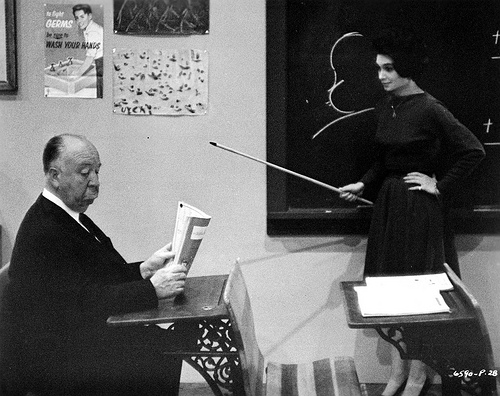
Gag shot: Suzanne Pleshette schools Hitch.
It is from here on in The Birds that we will begin to see some resolution to the problems of these characters. In previous installments, we have seen that Hitchcock described them as exhibiting “complacency,” especially Melanie. I have also argued that the film is a meditation on how modern complacency as such is destroyed through an encounter with the uncanny. But let us now ask why these characters in particular, and modern man generally, exhibit complacency. The answer has to do with abandonment, understood in both biographical and metaphysical senses.
Melanie was abandoned by her mother, literally. Without a positive female role model in her life, she seems to drift, seeking attention from all and sundry, jumping into fountains, playing practical jokes, and enjoying the role reversal of pursuing men (in an outboard boat, no less). The Brenner family was “abandoned” by Frank Brenner, Mitch’s father, whose untimely death has thrown his family off-kilter. As Annie alludes to in conversation with Melanie, Lydia was devastated by Frank’s death. As a result, she fears abandonment (as Annie literally puts the matter). In turn, this has caused her to cling to Mitch as if he were a surrogate husband, and to sabotage his relationships with women. The result for Mitch is that he is caught in an Oedipal relationship with his mother and cannot grow as a man. In consequence, Annie was abandoned by Mitch and left to wither in spinsterhood across the bay.
In what sense is modern man “abandoned”? Abandoned by the gods, Heidegger would say. He speaks in more than one text of the “flight of the gods.” In Introduction to Metaphysics, he writes, “on the earth, all over it, a darkening of the world is happening. The essential happenings in this darkening are: the flight of the gods, the destruction of the earth, the reduction of human beings to a mass, the preeminence of the mediocre.” [2] In later texts, including Holzwege, the idea of the loss of the gods (Entgötterung) or their flight becomes more important. But what does it mean? Heidegger’s idea of “the gods” is complex and it is impossible to do justice to it here. At the risk of greatly oversimplifying things, the flight of the gods in modernity means the apparent loss of any dimension of meaning to things that does not reduce to utility.
In post-war modernity, all beings, including human beings, are reduced to the status of a “standing reserve” that is continually being consumed and replenished. All that exists is standardized, commodified, and interchangeable. The modern world is, in its essence, an engine of consumption whereby these beings are continually being used up and then replaced. Further, the modern world exists for no higher purpose other than this cycle of consumption and replacement. Abandoned to this fate, most fall into line and consume with, indeed, abandon. Even their self-conception is defined as “standing reserve” (i.e., they understand themselves merely as material for use: “consumers,” “employees,” etc.). To fill this empty void called modern “life,” they busy themselves with consumption and with pointless and trivial distractions — just as Melanie Daniels does. And they wait to die — whereupon they will be replaced by equally replaceable consumers.
And this lasts until there is a shift in the meaning or being of things — until another Event comes along (see part four for an explanation of Heidegger’s concept of das Ereignis, the Event). If it comes. I have argued in this series that The Birds represents the coming of such an Event; a sudden and fundamental shift in meaning. This is not something that can be brought about or controlled by human beings. It simply comes. (Though, to a very limited extent, human beings can prepare for it, or prepare the ground for it.)
There may not be a next Event, and if it arrives it may not “cancel” the modern understanding of beings as “standing reserve.” It may usher in something worse (though that is hard to imagine). But let us suppose that it does indeed cancel modernity, and even that it heralds something of a return to attitudes and ways of being that have their roots in pre-modernity (as Hitchcock seems to suggest — e.g., with the townswomen’s sudden return to “superstition”). Then such an Event would be our “salvation” in the sense that it might heal us of the abandonment I have spoken of. In The Birds, the characters are eventually healed of their own abandonment through their conflict with nature suddenly gone mad.
We will see how the other characters heal by the end of the film, but Annie is the first. As I have noted, she is healed through an act of self-sacrifice, which is yet another form of “abandonment,” the abandonment of the ego and its pretensions, fixations, and self-pity. This idea of self-abandonment is, as it were, the “other end” of what Heidegger calls Gelassenheit. This term literally means “having-let-go-ness.” The term originates with Meister Eckhart, and Eckhart commentators have sometimes glossed it as “serenity.” Heidegger translators have rendered it “releasement,” or even “letting-beings-be.” All these translations make a certain amount of sense.
Thomas Sheehan explains Gelassenheit’s meaning as follows: “the point of . . . releasement (Gelassenheit) is to recognize the intrinsic hiddenness of one’s appropriation, to actively leave it in its hiddenness, and to live, finitely and mortally, from out of it.” [3] Those who have read part five of this series will remember that what Heidegger refers to as “the clearing” (die Lichtung) is the “space” opened up by Dasein, by human being, in which the being or meaning of things becomes present to us. For Heidegger, the clearing is intrinsically “hidden” because it is the condition that makes possible all intelligibility; thus, it cannot itself be made intelligible. The clearing and fundamental changes in the clearing (i.e., the Event, or what Sheehan calls “appropriation”) remain mysteries to us.
This presents us with two choices. We could deny mystery outright and seek to cancel hiddenness; to demand that everything must become completely present to us. This is the way of the “Absolute Ego” of the German idealists (specifically J.G. Fichte and his followers) which seeks to cancel the otherness of the other; to overcome the subject-object distinction. It is also the way of modernity, which demands that everything be transparent and manipulable. It is also the way of nihilism, for such a demand literally de-stroys the world (from Latin dēstruō: dē-, as in “un-,” + struō, “I build”). The other way is to surrender to mystery. This is Gelassenheit. But in order for this “releasement” to happen, there must be an abandonment of the ego’s will to power. [4] Certainly, Eckhart would have understood this, and I doubt Heidegger would have disputed it. By the end of The Birds, we will have been presented with a shocking symbolic enactment of self-abandonment/releasement, performed by Melanie Daniels.
To return to our story, Mitch, Melanie, and Cathy now return to the Brenner home to prepare for the next battle in the “bird war.” Of course, the smart thing would have been for them to have to picked up Lydia and hightailed it out of Bodega Bay, as far away as possible. But then we would have been deprived of the film’s dramatic, final act.
It is now the early evening and Mitch is on a ladder, in the process of boarding up every window of the house. Melanie, whom he now calls “darling,” is helping out by handing him wooden planks. Together, they look across the bay. Hitchcock shows us their point of view, which is another trick, composite shot. We see hundreds of black spots flying over the bay. Below them, white spots representing gulls speckle the surface of the water. The skies are grey and ominous. As noted in an earlier installment, the skies over Bodega Bay were usually sunny during filming, so all of the shots of overcast skies were matte paintings. An overhanging tree appears to have been painted in.
“It seems like a pattern, doesn’t it?” says Mitch. “They strike and disappear, and then they start massing again. It doesn’t look so very different, does it? A little smoke hanging over the town, but otherwise. . .” In the screenplay, but not in the finished film, Melanie says, “It does look very much the same, Mitch. This could be last week.” To which Mitch replies, “It may not be last week again for a long, long time.” In fact, it will never be last week again.
We learn that Melanie has been trying to call her father once more but that the phones are dead. Thankfully, the power is still on. Lydia calls to Mitch from inside the house, saying that she’s hearing something on the radio. Mitch and Melanie rush inside, and then, with Lydia and Cathy, they stand anxiously in the living room, listening to the affected voice of the radio announcer:
In Bodega Bay early this morning, a large flock of crows attacked a group of children who were leaving the school during a fire drill. One little girl was seriously injured and taken to the hospital in Santa Rosa, but the majority of children reached safety. We understand there was another attack on the town, but this information is rather sketchy. So far, no word has come through to show if there have been further attacks. [Then, the announcer’s voice brightens:] On the national scene in Washington. . .
“Was that all?!” Mitch says with disgust, and then begins tending to the fire. Once more, these characters have been abandoned.
These scenes, and those to come, are loosely based on du Maurier’s short story: just after boarding up the house, Nat and his wife listen to the radio hoping for some indication that help is on the way. In the short story as well, they are left with the impression that they have been abandoned; that no one takes their plight seriously. Unlike the film, they learn that strange bird activity has been reported all over the country. But the radio announcer almost seems to make light of the whole thing:
Nat had the impression that this man, in particular, treated the whole business as he would an elaborate joke. There would be others like him, hundreds of them, who did not know what it was to struggle in darkness with a flock of birds. There would be parties tonight in London, like the ones they gave on election nights. People standing about, shouting and laughing, getting drunk. “Come and watch the birds!”
This observation is clearly a reflection of well-founded class resentment: Nat is convinced that London elites do not fundamentally care what happens to people in the provinces — and he is correct. Just a few hours later, however, once the birds have created havoc for the country’s power centers, the quality of the radio announcer’s voice has changed: “His voice was solemn, grave. Quite different from midday.”
In the film, this class dynamic is completely absent. Melanie is a poor little rich girl. Though the Brenners have a farm, they are not “farmers” in the sense in which Nat and his family are. The Brenners are educated and upper-middle class. Mitch is an affluent criminal lawyer who maintains an apartment in San Francisco. His father was probably a successful businessman or quite possibly a lawyer as well. Their living room is full of weighty tomes. [5] Hunter’s script specifies of Lydia that “there is nothing agrarian-looking about her. She speaks with the quick tempo of the city dweller, and there is lively inquiry in her eyes.”
The reason for this change is to provide the large, urban cinema audience with characters they can more easily identify with. And, indeed, Hitchcock would have found it hard to identify with real farmers. When rural America is depicted in his films it is always a gentrified America with the feel of the English countryside, as in The Trouble with Harry and Marnie. About the closest you get to a real “salt of the earth” type in a Hitchcock film is that man Cary Grant meets at the crossroads in North by Northwest. But this change to the characters in The Birds also allows Hitchcock to make some interesting points he could not otherwise have made. As I have said repeatedly in this series, the characters in the film are portraits of spoiled, complacent, self-absorbed modern people. This would have been impossible had the main characters remained simple rural types, since it is affluent urbanites who are the principal carriers of modern pathologies.
In the film, after hearing the brief news report about Bodega Bay, the radio continues to play in the background. Evan Hunter’s script specifies what is heard, but in the finished film the radio plays at such a low volume under the dialogue it is impossible to tell whether the script is being followed to the letter. What Hunter had scripted, regardless of whether it is was actually used, is worth taking a look at. From the news about Bodega Bay, the announcer segues into the latest news out of Washington, D.C. where the President has just given his State of the Union address to Congress. We then hear portions of the President’s speech, addressing America’s relations with the rest of the world:
These various elements of our foreign policy lead as I have said to a single goal. The goal of a peaceful world of free and independent states. This is our guide for the present and our vision for the future — a free community of nations, independent but interdependent, uniting north and south, east and west, in one great family of man, outgrowing and transcending the hates and fears that rend our age. We will not reach that goal today or tomorrow. We may not reach it in our lifetime. But the quest is the great adventure of our century. We sometimes chafe at the burdens of our obligations, the complexity of our decisions, the agony of our choices, but there is no comfort or security for us in evasion, no solution in abdication, no relief in irresponsibility. . . .
And on and on. It is a series of empty political and moral platitudes — which is the whole point. Just as in du Maurier’s story, while the platitudes fly fast and wet from establishment elites, our cast of characters fights for their lives against nature gone mad. Previously, we thought we lived in a state of peaceful coexistence with the birds. Now they have turned into an implacable foe with whom it is impossible either to communicate or to reason. Was this hostility simmering beneath the surface the entire time? Are we ever really at peace with other species, or was Heraclitus right that all of reality is actually a state of war? Meanwhile, the American President prates about the “family of man,” and about “transcending hates and fears.” The truth is that there is no “family of man,” just like there is no “family of nature.”
We are told in Isaiah 11:6-8 (the same book of the Bible quoted earlier by the drunk),
The wolf also shall dwell with the lamb, the leopard shall lie down with the young goat, the calf and the young lion and the fatling together; and a little child shall lead them. The cow and the bear shall graze; their young ones shall lie down together; and the lion shall eat straw like the ox. The nursing child shall play by the cobra’s hole, and the weaned child shall put his hand in the viper’s den.
But this is just bollocks. As Joseph Campbell said many years ago, “No, the lion is going to eat the lamb, but that is the way of nature.” Hates and fears will never be transcended; they are woven into the very fabric of existence. As we will see very soon, at least one of the characters in the film has drawn the correct tribalist conclusions from this.
It is after listening to the radio that Lydia begins showing definite signs of strain. She asks Mitch if he has made sure that the attic windows have been boarded up (they have). “When do you think they’ll come?” she asks. Mitch replies that he doesn’t know, and how could he? “If there are bigger birds, Mitch, they’ll get into the house,” she says, becoming increasingly agitated. “Maybe we ought to leave.” Mitch rejects this suggestion, saying “Not now. Not while they’re massing out there.” “When?” Lydia asks crisply. “Where will we go?” She is now pointedly interrogating him.
Melanie and Cathy watch the scene unfold with evident concern. “What happens when we run out of wood?” Lydia demands. Exasperated, Mitch responds, “I don’t know. We’ll break up the furniture.” It is at this point that Lydia explodes, screaming at him: “You don’t know, you don’t know! When will you know?! When we’re all dead?! Like Annie?!” That last question is almost inaudible, as Cathy suddenly intervenes between the two of them and bursts into tears. To add insult to injury, Lydia adds, “If only your father were here . . . !”

Mitch is visibly wounded by this remark, and Lydia stops short, catching herself, realizing she has gone too far and said that which was supposed to remain unsaid. She has impugned his masculinity. Lydia has stunted her own son’s growth as a man, emotionally blackmailing him into the role of surrogate husband, and undermining his relationships with women. But in the peculiar way of women, she is now mocking him for allowing her to do this; she is challenging him to stand up to her. Her reaction is not brought about by any specific failure in his recent actions (how can he, in fact, know the answers to the questions she bombards him with?). Rather, it is an expression of a general dissatisfaction with her son’s unwillingness to challenge her, and to grow and become independent.
She had kept this hidden (and perhaps she was not consciously aware of it), but the crisis and her mounting anxiety have brought it into the open. There is dialogue in the original script which makes this whole unhealthy mother-son dynamic even more obvious, though it does not make it into the finished film. Originally, Mitch was to have responded to Lydia’s outburst by saying, rather pathetically, “Mother! I’m trying my best!” Then, shaking his head, “I’m. . . trying. . . my. . .” Ugh. But this is Hunter trying to bring out more clearly the “predicament” of the Mitch character (which is not so clear in the finished film). Each of the characters is affected and transformed by their encounter with the birds. The effect on Mitch is to make him more of a man.
Hunter bemoaned the casting of Rod Taylor as Mitch, describing the actor as “so full of machismo you expect him to have a steer thrown over his shoulder.” A less overtly masculine actor might have brought out the character’s weakness more clearly. Hitchcock stars James Stewart, Gregory Peck, or even Cary Grant (whose Roger Thornhill in North by Northwest is not unlike Mitch) could have pulled this off, but all were too old by this time to be romancing Tippi Hedren, and far too old to have an eleven-year-old sister. It is possible to defend the casting of the hyper-masculine Taylor, on the grounds that even the most masculine appearing modern men are un-masculine in spirit. Putting it in Evolian terms, the absence of “spiritual virility” is most striking when coupled with the presence of physical virility. The trouble is that this is lost on the audience, as the “developmental arc” of this character is the least clear in the entire film (how the other characters change is much more obvious).
In any case, Lydia apologizes for her outburst, and it is quickly forgiven and forgotten. Mitch and Melanie step outside and look up at the darkening skies. Thousands of birds are flying overhead. “Where are they heading?” Melanie asks. Mitch suggests they are headed inland. “Santa Rosa?” Melanie asks. “Maybe,” he says. This is the first suggestion that the “bird war” may be spreading to locations beyond Bodega Bay. There will be a further suggestion near the end of the film. In du Maurier’s story, the attacks have spread across the entire UK. Hitchcock wanted to leave all of this indefinite, but, as I will suggest later, I think that the most likely outcome to the story is that the attacks do indeed spread far, far beyond Northern California.
We now dissolve to some point later in the evening, when the foursome is seated together in the living room, keeping vigil, waiting for the next onslaught. Coffee has been drunk. Lydia sits removed from the others in a chair between the piano and a wall. One of her hands grips the piano, the other is pressed against the wall. Her body language conveys extreme anxiety. Melanie and Cathy sit huddled together on the couch, holding hands. Melanie has one arm protectively around the girl’s shoulder. Mitch is the only one who stands. He is checking and re-checking the fortifications he has created at the windows. A fire burns in the fireplace.
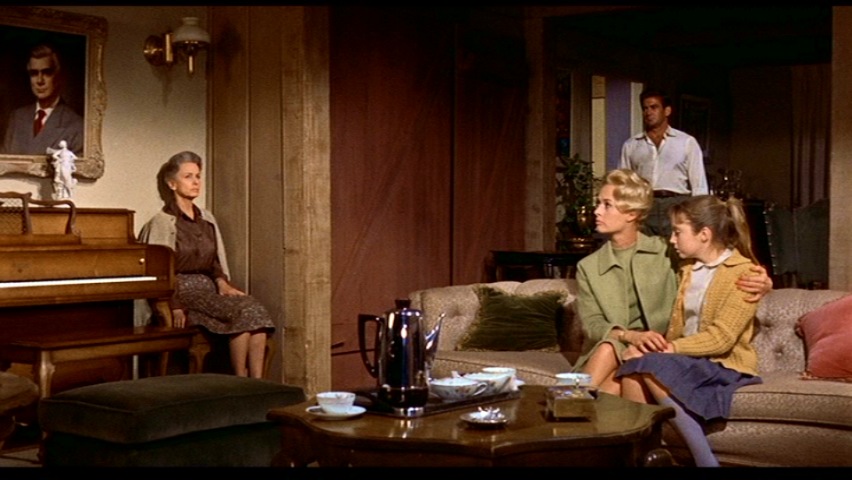
Suddenly, Cathy asks Mitch if she can bring the lovebirds into the room. “No!” shrieks Lydia. “But Mom,” Cathy protests, “they’re in a cage.” “They’re birds, aren’t they?!” Lydia shoots back. Now, this is obviously not a “rational” response. Cathy is right: those little lovebirds will not be able to get out of their cage to do any mischief. But Lydia’s response is not actually moved by such a concern. Instead, her tone and emphasis make clear that she speaks out of hate. It’s “us vs. them” time. The birds are now, quite justifiably, the hated “other”; the tribe at war with the humans.
Lydia’s tribalism is a healthy, normal, and necessary response — and she is way ahead of the others. Women “get” these sorts of things on a deep, sub-rational level, no matter what duckspeak they’ve been taught to quack. Melanie gets that the crows were after the schoolchildren out of blind hate, for no reason other than to kill them (while the unfeminine Mrs. Bundy listens in disbelief). Annie gets what’s coming when, at the children’s birthday party, she says “that makes three times” — speaking, as Camille Paglia brilliantly observes, “like a Roman augur.” [6] The women in the Tides get that something uncanny is happening, that all the jazz about “reason” is out, and that the new girl in town may somehow be responsible.
Humoring his mother, Mitch tells Cathy that the lovebirds should be left in the kitchen. Then he heads there himself, as Lydia scans the ceiling as if scanning the skies, waiting for the birds to come. In the kitchen, he examines the doors and windows to make sure they are securely covered. On his way out, Mitch looks down at the lovebirds, perched placidly in their cage, on a table by the door. There is a slight suggestion of hatred in his eyes as he looks at them. Then he rejoins the others. They all sit and wait. Cathy suddenly asks Mitch, “Why are they doing this? The birds?” Mitch responds, “I don’t know, honey.” Cathy persists: “Why are they trying to kill people?” “I wish I could say,” he answers. In the script, Mitch adds, “But if I could answer that, I could also tell you why people are trying to kill people.” Thankfully, this line was eliminated before shooting.
Unable to sit still any longer, Lydia quietly rises and moves to the coffee table. Slowly but with evident tension, she begins gathering the coffee cups onto the tray, as Melanie watches her intently with sympathetic eyes. Lydia removes the tray to the kitchen and then returns. All of them keep their eyes on the ceiling, scanning it, listening. It is at this point that Cathy becomes literally sick with fear. Lydia starts to rise to go to her daughter, but Cathy seems to want Melanie’s help. Together, they move offscreen, presumably to the bathroom, and we hear the sound of Cathy coughing as she vomits.
When Melanie and Cathy return, it begins.
If you want to support our work, please send us a donation by going to our Entropy page and selecting “send paid chat.” Entropy allows you to donate any amount from $3 and up. All comments will be read and discussed in the next episode of Counter-Currents Radio, which airs every Friday.
Don’t forget to sign up for the twice-monthly email Counter-Currents Newsletter for exclusive content, offers, and news.
Notes
[1] Camille Paglia, The Birds. London: Bloomsbury — British Film Institute series, 2020 (1998), 81.
[2] Martin Heidegger, Introduction to Metaphysics, trans. Gregory Fried and Richard Polt. New Haven: Yale University Press, 2000, 47.
[3] Thomas Sheehan, Making Sense of Heidegger: A Paradigm Shift. Lanham, Maryland: Rowman and Littlefield, 2015, 257. Italics in original.
[4] This is something of a simplification of Heidegger’s position. His real answer to the Fichtean-modern position is not to say something along the lines of “the subject must surrender to the otherness of the object.” Rather, he wishes to critique the subject-object distinction as such. So long as we conceive of ourselves as “subjects” existing in separation from an “external world,” within an “interior,” then beings must present themselves as “others” pegged by the “subject” as “objects” of investigation or manipulation. To demand that we “let them be” is to imply that we could, if we wished, not let them be and truly make good on our will to make them fully transparent and manipulable. What must thus be overcome is the very idea of a subject existing “apart.” This is a project that is already announced in Being and Time, but is really only fully developed in Heidegger’s late teaching of the “fourfold.” Incidentally, the points just made also serve to identify the fallacy inherent in today’s “environmentalism.” Instead of challenging the idea of man as “master of nature,” that movement implicitly affirms a modern, Promethean conception of man as an omnipotent being capable of “destroying nature” if he wished, and if he does not mend his ways.
[5] There is a bit of a gaffe here, though: if one freezes the frame and looks closely, one will see that the shelves sometimes contain multiple copies of the same exact book!
[6] Paglia, 61.
The%20Birds%20Or%3A%20Everything%20You%20Always%20Wanted%20to%20Know%20About%20Coronavirus%20%28But%20Were%20Afraid%20to%20Ask%20Hitchcock%20and%23038%3B%20Heidegger%29%2C%20Part%20Seven
Share
-
- Gab
- Or: Everything You Always Wanted to Know About Coronavirus (But Were Afraid to Ask Hitchcock Heidegger), Part Seven &body=%0D%0A%0D%0A%0D%0A%0D%0A%0D%0A%0D%0Ahttps://counter-currents.com/2020/07/the-birds-or-everything-you-always-wanted-to-know-about-coronavirus-but-were-afraid-to-ask-hitchcock-heidegger-part-seven/%0D%0A%0D%0A%0D%0A%0D%0A">
Enjoyed this article?
Be the first to leave a tip in the jar!
4 comments
“We could deny mystery outright and seek to cancel hiddenness; to demand that everything must become completely present to us. This is the way of the “Absolute Ego” of the German idealists (specifically J.G. Fichte and his followers) which seeks to cancel the otherness of the other; to overcome the subject-object distinction. It is also the way of modernity, which demands that everything be transparent and manipulable. It is also the way of nihilism.”
The core of Evola’s basic philosophy was the Absolute Individual, based on Fichte and the other German Idealists, but of course “perfected” by Evola himself. Based on what I’ve been able to grasp of it, it would seem to be exactly as you describe Fichte. Evola is quite clear that he never deviated from this view, and all his later excursions into magic, Traditionalism, etc. were based on it. Does this not mean that Evola, rather than being in “revolt against the modern world,” is in fact the purest expression of modernity?
This also gives an interesting implication to what he described as his main influences at the time: Nietzsche, Oscar Wilde, and two Jewish suicides (Mittlestaedt and Weininger).
I think you are right. Evola may not be the “purest” expression modernity, but his “Magical Idealism,” which, as you say, he never really abandoned, is a radical development of modernity’s “subjective turn.” It is hard to see how it is compatible, in the end, with an anti-modern Traditionalism. You have laid the foundations of a Heideggerean critique of Evola. I may write something about this….
An interesting series of articles.
Over intellectualized though. Sometimes a story is just a story.
Yawn.
Comments are closed.
If you have Paywall access,
simply login first to see your comment auto-approved.
Note on comments privacy & moderation
Your email is never published nor shared.
Comments are moderated. If you don't see your comment, please be patient. If approved, it will appear here soon. Do not post your comment a second time.